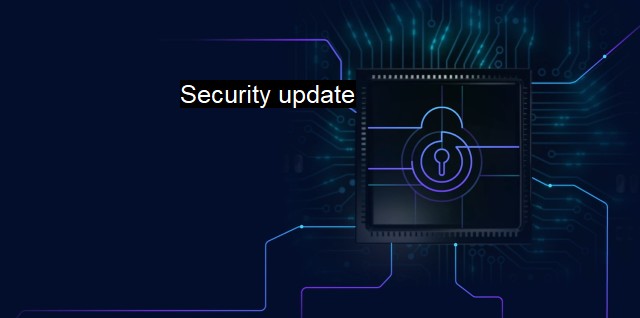What is Security update?
Staying Protected: The Importance of Security Update in Cybersecurity and Antivirus Measures
The term "security update" assumes critical importance. A security update is essentially a modification, fix, or patch applied to an operating system, software, hardware, or application to rectify security vulnerabilities or improve overall security. These deficiencies, if left untreated, could have disastrous effects, including unauthorized access, data corruption, and theft of confidential information. They are critical tools in maintaining the optimal functioning of any computer system and avoiding any malware attacks or other security-related concerns.Security updates usually come from the software's manufacturer or the provider of the operating system. Ideally, these updates are error-free. the inherently complex nature of computer systems often results in the creation of entirely new problems, necessitating further updates. These are achieved through various mechanisms, but firmware updates executed over the internet have become a popular method, being quicker, easier and with a broader reach.
Usually, hackers target older versions of system software because they are certain to contain security flaws. It is, therefore, safe to consider security updates as a prophylactic barrier against cybersecurity threats, internal or external. These updates are very different from typical software updates, as the latter may add new features and improve usability but don't necessarily tackle security vulnerabilities.
To prioritize system security, companies often release security updates periodically, every month or quarter, based on the findings of intensive penetration testing. some potential security threats are so severe that security updates, sometimes termed as out-of-band updates or emergency hotfixes, are immediately necessitated. For regular users, this translates into an imperative need for keeping their systems updated as regularly as possible.
Another key aspect that puts these updates into perspective is antivirus software. Antivirus software works tirelessly to neutralize threats from viruses and malware that could harm a computer system. A lot of software vulnerabilities stem from the fact that malware exploit these weaknesses to deliver their payloads. Security updates typically aim to fix these vulnerabilities to significantly minimize the risk of a successful malware infiltration.
Antivirus vendors regularly provide security updates, often called definitions. These definitions enable the antivirus to identify and eradicate the latest viruses or malware that pop up across the internet. Without these updates, an antivirus might not recognize an ongoing threat, leading to potential infiltration and data corruption or loss. a non-updated antivirus signifies a significantly reduced capacity to detect and address novel malware threats, giving these threats an opportunity to exploit system vulnerabilities successfully.
Another measure includes upgrading to the latest antivirus versions offered by vendors when they become available, including embracing new scanning capabilities, threat identification systems, and different techniques to segregate and demolish malware. These comprehensive updates help preserve system security and ensure error-free system operation in the long term.
Security updates are an indispensable part of ensuring system security and data protection in an environment that is highly dynamic and fraught with growing threats. All software, hardware or application, demands consistent monitoring and timely updates to remain robust against these cyber threats. For an average user, simply installing an antivirus or using a firewall doesn't suffice. Regular security updates symbolize a proactive approach to system security administration, attention to security loopholes and eventual elimination of vulnerabilities, hence, securing hardware or software in its entirety. Therefore, embracing regular security updates is no more a choice but an absolute necessity in our increasingly digitalized world. In the continual battle against cybersecurity threats, they represent one of our most effective weapons.

Security update FAQs
What is a security update?
A security update is a software update that is designed to fix vulnerabilities and improve security in order to protect a system or technology from cyber attacks.Why is a security update important?
A security update is important because cyber attacks are constantly evolving, and vulnerabilities are being discovered all the time. Failure to install security updates can leave your system vulnerable to attack, and can increase the risk of data breaches or other cybersecurity incidents.How often should I install security updates?
You should install security updates as soon as they become available. Many cyber attacks exploit known vulnerabilities that have already been patched by the software provider. By regularly installing security updates, you are helping to ensure that your system is protected against the latest threats.What if I don't install security updates?
If you don't install security updates, your system may be vulnerable to cyber attacks. Attackers can exploit unpatched vulnerabilities to gain access to sensitive data or to take control of a system. Failure to install security updates can also make it more difficult to detect and respond to potential security incidents. In short, not installing security updates can put your system and data at risk.| | A | | | B | | | C | | | D | | | E | | | F | | | G | | | H | | | I | | | J | | | K | | | L | | | M | |
| | N | | | O | | | P | | | Q | | | R | | | S | | | T | | | U | | | V | | | W | | | X | | | Y | | | Z | |
| | 1 | | | 2 | | | 3 | | | 4 | | | 7 | | | 8 | | |||||||